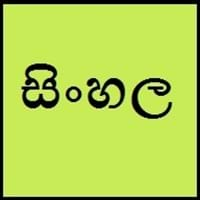Cebuano vs Sinhalese
Countries
Philippines
Sri Lanka
National Language
Philippines
Sri Lanka
Second Language
Philippines
Sri Lanka
Speaking Continents
Asia
Asia
Minority Language
Not spoken in any of the countries
Not spoken in any of the countries
Regulated By
Visayan Academy of Arts and Letters
Hela Havula (හෙළ හවුල)
Interesting Facts
- About one-fifth of the population of the philippines speak cebuano and are second largest ethnolinguistic group in the country.
- Cebuano contains many words of Spanish origin.
- In Sinhalese language, there are many loanwords from Dravidian languages mainly Tamil, Portuguese, Dutch and English.
- Sinhalese language has it own script/ writing system.
Similar To
Hiligaynon Language
Maldivian Language
Derived From
Island of Cebu
Sanskrit Language
Alphabets in
Cebuano-Alphabets.jpg#200
Sinhalese-Alphabets.jpg#200
Scripts
Latin
Sinhala alphabet
Writing Direction
Not Available
Left-To-Right, Horizontal
Thank You
Salamat
ඔබට ස්තුතියි (obaṭa stutiyi)
How Are You?
Kumusta man ka?
ඔබ කොහොමද (oba kohomada)
Good Night
Maayong Gabii
සුභ රාත්රියක් (subha rātriyak)
Good Evening
Maayong Gabii
සුබ සැන්දෑවක් (suba sændǣvak)
Good Afternoon
Maayong Hapon
සුභ සන්ධ්යාවක් (subha sandhyāvak)
Good Morning
Maayong Buntag
සුභ උදෑසනක් (subha udǣsanak)
Please
Palihug
කරුණාකර (karuṇākara)
Sorry
Ikasubo ko
සමාවන්න (samāvanna)
I Love You
Gihigugma ko ikaw
මම ඔයාට ආදරෙයි (mama oyāṭa ādareyi)
Excuse Me
Ekskyus mi
මට සමාවෙන්න (maṭa samāvenna)
Where They Speak
Bohol
Sri Lanka
Dialect 2
Southern Kana
Not Available
Where They Speak
southern Leyte
Not Available
Dialect 3
North Kana
Not Available
Where They Speak
northern part of Leyte
Not Available
How Many People Speak?
Not Available
Native Name
Visayan
සිංහල (sĩhala)
Alternative Names
Binisaya, Bisayan, Sebuano, Sugbuanon, Sugbuhanon, Visayan
Cingalese, Singhala, Singhalese, Sinhala
French Name
cebuano
singhalais
German Name
Cebuano
Singhalesisch
Pronunciation
Not Available
Not Available
Ethnicity
Cebuano people
Sinhalese people
Language Family
Austronesian Family
Indo-European Family
Subgroup
Not Available
Indo-Iranian
Branch
Not Available
Indic
Early Forms
No early forms
Sinhalese Prakrit
Standard Forms
Standard Cebuano
Modern Sinhalese
Signed Forms
Not Available
Not Available
Scope
Individual
Individual
ISO 639 1
No data Available
si
ISO 639 6
Not Available
Not Available
Glottocode
cebu1242
sinh1246
Linguasphere
No data Available
No data available
Language Type
Living
Living
Language Linguistic Typology
Verb-Subject-Object
Subject-Object-Verb
Language Morphological Typology
Not Available
Fusional
Cebuano and Sinhalese Language History
Comparison of Cebuano vs Sinhalese language history gives us differences between origin of Cebuano and Sinhalese language. History of Cebuano language states that this language originated in 16th century whereas history of Sinhalese language states that this language originated in 3. Family of the language also forms a part of history of that language. More on language families of these languages can be found out on Cebuano and Sinhalese Language History.
Cebuano and Sinhalese Greetings
People around the world use different languages to interact with each other. Even if we cannot communicate fluently in any language, it will always be beneficial to know about some of the common greetings or phrases from that language. This is where Cebuano and Sinhalese greetings helps you to understand basic phrases in Cebuano and Sinhalese language. Cebuano word for "Hello" is Hoy or Sinhalese word for "Thank You" is ඔබට ස්තුතියි (obaṭa stutiyi). Find more of such common Cebuano Greetings and Sinhalese Greetings. These greetings will help you to be more confident when conversing with natives that speak these languages.
Cebuano vs Sinhalese Difficulty
The Cebuano vs Sinhalese difficulty level basically depends on the number of Cebuano Alphabets and Sinhalese Alphabets. Also the number of vowels and consonants in the language plays an important role in deciding the difficulty level of that language. The important points to be considered when we compare Cebuano and Sinhalese are the origin, speaking countries, language family, different greetings, speaking population of these languages. Want to know in Cebuano and Sinhalese, which language is harder to learn? Time required to learn Cebuano is 3 weeks while to learn Sinhalese time required is 44 weeks.





